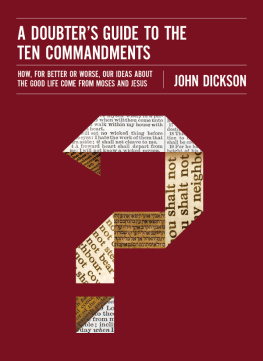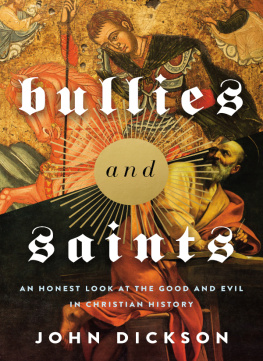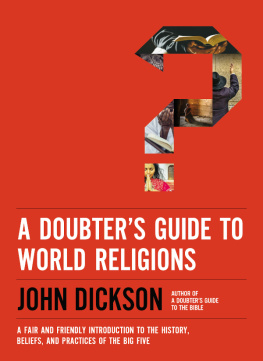John Dickson - Is Jesus History?
Here you can read online John Dickson - Is Jesus History? full text of the book (entire story) in english for free. Download pdf and epub, get meaning, cover and reviews about this ebook. year: 2019, publisher: The Good Book Company, genre: Religion. Description of the work, (preface) as well as reviews are available. Best literature library LitArk.com created for fans of good reading and offers a wide selection of genres:
Romance novel
Science fiction
Adventure
Detective
Science
History
Home and family
Prose
Art
Politics
Computer
Non-fiction
Religion
Business
Children
Humor
Choose a favorite category and find really read worthwhile books. Enjoy immersion in the world of imagination, feel the emotions of the characters or learn something new for yourself, make an fascinating discovery.

- Book:Is Jesus History?
- Author:
- Publisher:The Good Book Company
- Genre:
- Year:2019
- Rating:5 / 5
- Favourites:Add to favourites
- Your mark:
- 100
- 1
- 2
- 3
- 4
- 5
Is Jesus History?: summary, description and annotation
We offer to read an annotation, description, summary or preface (depends on what the author of the book "Is Jesus History?" wrote himself). If you haven't found the necessary information about the book — write in the comments, we will try to find it.
Is Jesus History? — read online for free the complete book (whole text) full work
Below is the text of the book, divided by pages. System saving the place of the last page read, allows you to conveniently read the book "Is Jesus History?" online for free, without having to search again every time where you left off. Put a bookmark, and you can go to the page where you finished reading at any time.
Font size:
Interval:
Bookmark:
Christianity has a problem.
Only one, you might ask?
Unlike other religions, Christianity gambles its plausibility on supposed historical events. Christians dont just say otherworldly things like, God loves you , We all need forgiveness , and Heaven is open to all. None of that sort of thing is the least bit confirmable, or falsifiable. We may mock such spiritual claims, but we cannot disconfirm them with counter-evidence.
But thats not really how Christians talk. Listen closely, and youll often hear them say things like Jesus lived in the Galilean village of Nazareth, or He had a widespread reputation as a healer, or He caused a scandal in the temple of Jerusalem around AD 30, or He suffered execution under a Roman governor named Pontius Pilate, or even His tomb outside the city wall was found empty a few days after his crucifixion, and his disciples saw him alive.
Statements like these are not completely immune from historical scrutiny. They touch times and places we know quite a bit about. They intersect with other figures (like Pilate) about whom we have reasonably good information. The alleged events all take place in a cultural and political melting potRoman Galilee and Judaeafor which we have thousands of archaeological remains and hundreds of thousands of words of ancient inscriptions and written records.
When people proclaim an intangible thing like the universal love of God, they are safe from scrutiny. But as soon as they say that their guy was crucified by the fifth governor of Judaea, they are stepping onto public turfand someone is bound to want to challenge the claim. And challenge they do!
For a few years now some of the best-selling books have been full-scale attacks on Christian claims by the worlds most brilliant atheists: Richard Dawkins, Christopher Hitchens, Michel Onfray, Lawrence Krauss, and so on. Hitchens, who sadly died a few years ago, speaks of the highly questionable existence of Jesus and the huge amount of fabrication in the stories written about him in the Gospels, the biographies of Jesus now found in the New Testament, the second part of the Christian Bible. He goes on:
Either the Gospels are in some sense literal truth, or the whole thing is essentially a fraud and perhaps an immoral one at that.
Its very strong stuff, and many similar-sounding statements can be found throughout the popular atheist literature of the last decade or two. And it is such good writingat least Hitchens prose is fabulousthat it is easy to get swept up into thinking that these public naysayers must have a strong body of expert opinion behind them.
The impression these writers leave us with, whether intended or not, is that specialists in the field of history also talk of the highly questionable existence of Jesus or the huge amount of fabrication in the Gospels. But this impression is dramatically false. Anyone who dips into the academic literature about the figure of Jesus will quickly discover that trained scholars, regardless of their religious or irreligious conviction, reckon we know quite a bit about the influential teacher from Nazareth.
An entire industry of double-checking the claims about Jesus of Nazareth has developed over the last 250 years. The study of the historical Jesus is a vast secular discipline today, found in major universities all around the world, including the two with which I have been most closely associatedMacquarie University and Sydney University, in Australia.
While there are certainly plenty of active Christians involved in this sub-discipline of ancient history, there are also a great many half-Christians, ex-Christians and Jewish scholars (lots of Jewish scholars), as well as self-confessed agnostics and atheists. This makes it very difficult for anyone writing and working in this field to get away with publishing theology under the guise of history, or privileging the biblical documents over non-biblical ones, or pretending we can prove most of what the New Testament says about Jesus.
The process of peer reviewwhere scholars publish their work in professional journals only after it has been double-checked by two or more independent (and anonymous) scholars of rankmight not be foolproof but it certainly filters out any works of propaganda. It also reduces the risk of fraudulent claims, and it keeps scholars constantly mindful of the rules of the history game.
At the same time, outside the universities and on the street this topic is filled with such emotion and vested interests that some folks wont accept any claim that points even vaguely in the direction of the historicity of Jesus. The other day I posted on social media a famous statement about Jesus from the great Albert Einstein, and it triggered quite a reaction from my sceptical friends and followers.
The great physicist was interviewed in 1929 by the journalist George Viereck and, among many other things, he was asked about some religious matters. It is well known that Einstein despised revealed religion as infantile; he did not even like the idea of a personal God. His religious outlook was little more than a vague hunch that behind the laws of nature there must be some infinitely superior spirit and reasoning power. Fair enough.
But the thing that annoyed my atheist friends was Einsteins admiration for the historical figure (yes, historical figure) found in the New Testament Gospels. Heres a portion of the interview:
Viereck: To what extent are you influenced by Christianity?
Einstein: As a child, I received instruction both in the Bible and in the Talmud. I am a Jew, but I am enthralled by the luminous figure of the Nazarene.
Viereck: You accept the historical existence of Jesus?
Einstein: Unquestionably! No one can read the Gospels without feeling the actual presence of Jesus. His personality pulsates in every word. No myth is filled with such life. How different,
Einsteins admiration for Jesus and his confidence that Jesus was a historical figure offer a nice contrast to the more recent dogmatism of the best-selling atheists, which is perhaps why my sceptical social-media friends were so resistant to accepting that the great physicist could ever have stated such glowing words about the founder of Christianity.
I literally had folks suggesting Vierecks interview itself was a fraud, even thoughas I pointed outit was published in one of 20th-century Americas most widely read magazines.
I had to dig it out of the archives and post screenshots of the relevant pages of the interview before some would believe that Einstein said such a thing. Even then, Im not sure other folk would accept it. Such is the power of preference to shape what we believe! More about that problem later.
This book is partly a spirited defence of the whole subject of history, as well as being (hopefully) a fair-minded account of one particular historical life. I am asking, Is Jesus History? but also Why and how does history as a discipline work?
We will explore ancient writings as well as modern methods. We will examine the role of faith or trust in all academic endeavours, including science. And we will briefly outline what we can confidently say about historical figures like Emperor Tiberius, Pontius Pilate, the High Priest Caiaphas, and, of course, Jesus of Nazareth, all of whom overlapped for a brief period of their careers in the late 20s and early 30s of what we call the first century.
For the last decade or so I have worn a silver denarius on a chain around my neck. This Roman coin was roughly equivalent to a days wages in the first centurythough it is worth a bit more today. Mine has the image of Emperor Tiberius on the front (the obverse) and his mother Livia on the back (the reverse). That tells us it was struck sometime between AD 14 and 37 (in the mint of Lyon, as it turns out), since the dates of Tiberius reign are firmly established.
Next pageFont size:
Interval:
Bookmark:
Similar books «Is Jesus History?»
Look at similar books to Is Jesus History?. We have selected literature similar in name and meaning in the hope of providing readers with more options to find new, interesting, not yet read works.
Discussion, reviews of the book Is Jesus History? and just readers' own opinions. Leave your comments, write what you think about the work, its meaning or the main characters. Specify what exactly you liked and what you didn't like, and why you think so.











